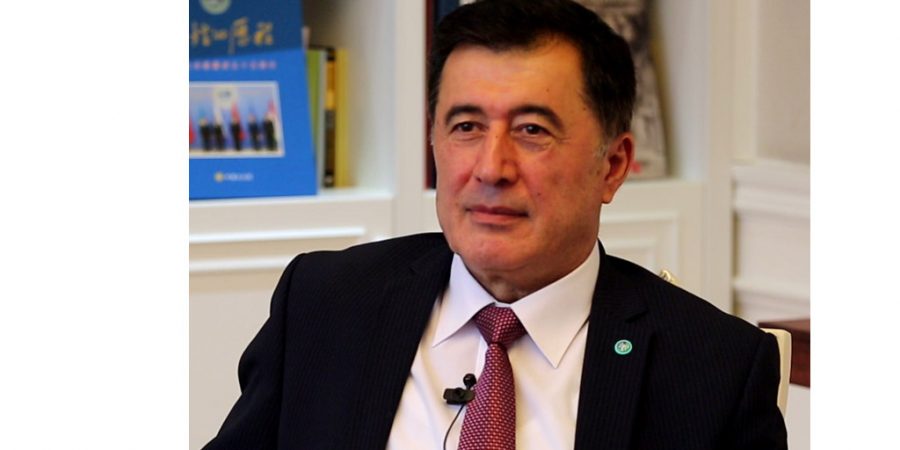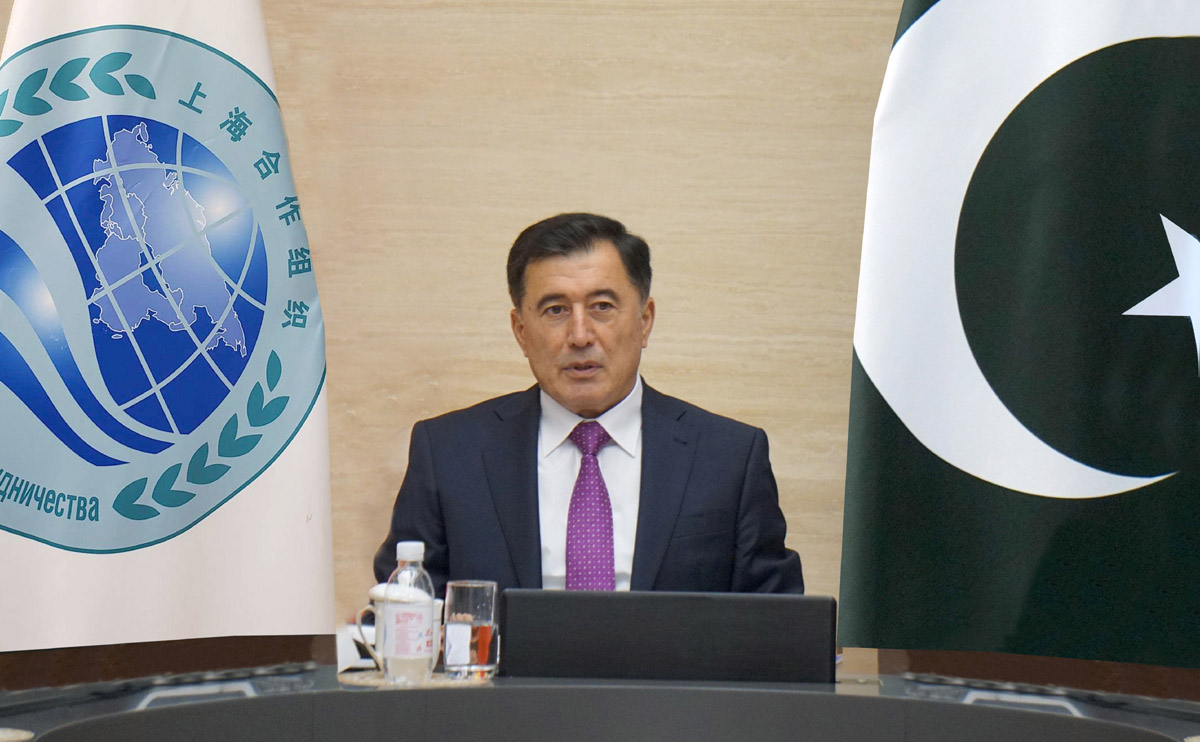We must refrain from politicizing Coronavirus pandemic

Vladimir Norov
According to UNCTAD (the UN Conference on Trade and Development), in 2020 and 2021, developing countries will lack US$2 trillion to meet their financial obligations. This could lead to a debt crisis in which many direct and indirect creditors in industrialized countries would be drawn. Developing countries have entered the crisis with record high debt levels relative to their economic indicators. As early as 2018, their total debt was almost 200 per cent of annual GDP.
The coronavirus pandemic “COVID-19” that hit the world just three months back has created an unprecedented crisis. It has almost completely changed the way millions of people live and has become a serious challenge for all humanity in this century.
First of all, the world is facing a critical state of public health capacity. The Coronavirus has now become a threat to the safety of all people on the planet. The pandemic COVID-19 has highlighted systemic weaknesses in health care. It demonstrated vulnerability in the global community’s ability to respond and prevent pandemic threats in a timely manner.
The second challenge is the global economic crisis, comparable in scale to the Great Depression of 1929. According to the World Trade Organization, the decline in world trade could reach more than 30% in 2020.
We can’t help but notice that certain negative trends in the world economy began even before the pandemic COVID-19. The process of economic globalization has begun to return to “trade wars”, with growth of unilateral protectionist measures and other challenges in international trade.
The international community is on the verge of a social, humanitarian and even food crisis.
The International Labor Organization stated that due to the COVID-19 pandemic, the labor market is experiencing the worst crisis since the World War II. Quarantine measures have resulted in temporary, full or partial business closures affecting 3.3 billion people – 81% of the world’s workforce.
The rise in unemployment, according to the Guardian, is at least 10 times faster than during the “Great Recession” of 2007-2009. According to the Managing Director of the IMF Ms. Kristalina Georgieva, more than 170 countries will see negative growth in per capita income in this year. As of now 85 countries have requested the IMF for financial assistance. This grim forecast applies to both developed and developing economies.
According to UNCTAD (the UN Conference on Trade and Development), in 2020 and 2021, developing countries will lack US$2 trillion to meet their financial obligations. This could lead to a debt crisis in which many direct and indirect creditors in industrialized countries would be drawn. Developing countries have entered the crisis with record high debt levels relative to their economic indicators. As early as 2018, their total debt was almost 200 per cent of annual GDP. This includes public and private debts, both domestic and abroad. UNCTAD, therefore, appeals to the developed countriesfor an ambitious support programs in their self-interest to prevent debt distress and humanitarian disaster. The IMF estimates that the gross external financing needed by emerging markets and developing countries is trillions of dollars. The head of IMF stated that they “need to be assisted immediately”. At the same time, German business publication Handelsblatt points out the need for an urgent moratorium on debt service for developing countries, as well as debt restructuring, following the example of the London Treaty, under which, after the Second World War, Germany’s debts were partly cancelled, extended or made conditional on sufficient export revenues.This idea is fully consistent with the proposal of the Prime Minister of Pakistan Imran Khan to restructure loans to developing countries.
In addition, the COVID-19 pandemic has a profound impact on all social processes in society, including criminal manifestations, especially organized crime and illicit markets. Interpol analysts note that criminals have quickly seized opportunities to exploit the crisis for their own gain. The number of cyber-attacks against organizations and individuals has been already significant and is expected to increase. Criminal groups have adopted new fraud schemes to take advantage of the fears of victims during the crisis. These include various types of adapted telephone and Internet fraudinvolving the supply of personal protective equipment and disinfection. The sale of counterfeit medical and hygiene products and personal protective equipment has increased significantlysince the beginning of the crisis.
“The Coronavirus pandemic is a serious threat to international peace and security,” UN Secretary-General António Guterres said during the UN Security Council meeting on 10 April 2020. He stressed that “the threat of terrorism remains as the weaknesses and lack of preparedness of different countries exposed by this pandemic provide a window of opportunity for launching terrorist attacks with the use of biological weapons as well as gaining access to dangerous strains
In the current Coronavirus pandemic, it is clear that for the first time, in at least 100 years, the world is facing a global crisis that will change economic, political and social realities dramatically.
In this difficult situation, I believe that, global solidarity and international cooperation are the only right choice to reduce the impact of these massive challenges.Unfortunately, even many developed countries are struggling to cope with the devastating scale of the disease. Social and economic consequences of the pandemic indicate that 90% of the COVID-19 cases and 88% of the deaths were in the G20 countries, despite the fact that these countries contribute 80% of the world’s GDP.
This shows that the virus has no borders, so the international community needs to come together to coordinate better and jointly fight the Coronavirus pandemic, share experiences in diagnostics and treatment, accelerate the development of drugs and vaccines, minimize health and life damage, and mitigate economic impacts. Trade wars and sanctions must be abandoned in order to ensure the smooth mutual supply of medicines, food, equipment and technology in order to save the lives of thousands of people.
“No country, not even the US, can defeat the virus solely through national efforts,” said former US Secretary of State Henry Kissinger. “The solution to the challenges currently required must be combined with a global joint vision and program. If we fail to develop both in tandem, we will face the worst-case scenario for each item. We are now living in an epochal period. It is a historic task for leaders to cope with the crisis while building the future. Failure to do so can ignite the world,” said the former US Secretary of State.
At the same time, the global pandemic, the concomitant atmosphere of anxiety and the quarantine measures are actively used to spread sinophobia, influence public and individual psyche by spreading conspiracy theories about the origin of the COVID-19 Coronovirus.
In that regard, we must first refrain from politicizing the topic of the Coronavirus pandemic, which is a global challenge to the entire international community and requires concerted action by all States. Pandemic COVID-19 should not be used for growth of populist sentiment, nationalism, xenophobia and attempts to split the world community.
In addition, the efforts of the World Health Organization (WHO) to fight the virus should be fully supported. In recent days, WHO’s activities have been under the scrutiny of the world community. It is a matter of concern that some countries question the effectiveness of WHO’s work.
Today, WHO is the only body within the UN system that can mobilize the necessary resources and coordinate response to contain the global threat of COVID-19 to public health in all countries of the world.The WHO has placed orders for 30 million diagnostic tests over the next 4 months. It is shipping nearly 180 million surgical masks in April and May, as well as 54 million face masks and more than 3 million pairs of protective goggles.International cooperation through the UN system is an essential and irreplaceable tool for addressing the global challenges of today’s world.
The member States of the Shanghai Cooperation organization (SCO) highly appreciate and fully support the activities of WHO, follow its recommendations on prevention and control of disease spread. The SCO intends to establish broad cooperation with WHO in order to strengthen public health in the Organization’s space, which is home to almost half of the world’s population.
There is also a need to look more closely at the good practices of countries such as China, South Korea, Singapore and others in combating the epidemic.
I can share my opinion about the Chinese experience, as I live and work in China. Since the threat of the virus was identified, authorities of China have adopted a centralized and scientific approach in fighting against the epidemic, and have defined a set of measures that are effective and targeted. Comprehensive and concrete actions have made it possible to establish an effective system of disease control, prevention and treatment. Measures aimed at early detection, early warning, early isolation and early treatment have had positive results. Resolute action by the Chinese authorities helped contain the coronavirus outbreak in the country.
It must be said that Chinese people have shown an exceptionally high degree of responsibility and understanding with regard to the decisions taken and restrictions imposed. Effective counter-epidemic measures in China, provision of reliable and transparent information, as well as recommendations developed by WHO based on the Chinese experience of fighting the Coronavirus epidemic have allowed the world to buy two months of precious time to prepare for the fight against the epidemic.
China’s success has inspired many countries. For example, India, the world’s second most populous country, has imposed a 21-day national lockdown since 25 March, and its viral infection and mortality rates are now much lower than in developed countries in the West.Indian Prime Minister Narendra Мodi recently announced that from April 20, restrictive measures will be relaxed in regions where there is a zero increase in cases.
WHO Director-General Mr. Tedros A. Ghebreyesus, at the Munich Security Conference on 15 February 2020, attended by leading policy-makers, public and academic representatives from the European Union and North America, called on all countries to prepare for the further possible spread of Coronavirus, and opposed politicization of the epidemic. “It is easy to blame and politicize, but it is harder to solve the problem together,” he said.
From the very beginning, the SCO member States realized seriousness of the great danger of the Coronavirus, and that inaction in this situation could lead to disastrous consequences. They advocate coordinated efforts to combat the Coronavirus pandemic. Many SCO member States currently have emergency systems, special government commissions and operational headquarters that are responsible for fighting COVID-2019 and containing its spread. At the same time, I would like to highlight the courage and dedication of medical workers in our countries, who are at the forefront of the fight against Coronavirus.
The SCO countries maintain close contacts with each other at the level of heads of state, heads of ministries and agencies responsible for health and public security. We have also implemented a set of measures to provide humanitarian assistance, at first it was directed to China, and now all our countries are involved in this process, providing each other with financial resources, food, medical equipment and medicines.
The SCO Secretariat, acting as a coordinating body, has put forward a number of proposals and initiatives to jointly combat Coronavirus.We intend to continue consultations on fight against Coronavirus at a higher level and work together to take decisive action against the spread of the disease. At the same time, the Regional Anti-terrorist Structure (RATS), in close coordination with the SCO member States, pays close attention to transnational and increasingly interconnected challenges and threats to security in the region in the context of emergency measures taken to combat Coronavirus.
As the Coronavirus spreads, more and more countries lack surgical masks, medical equipment and basic necessities, and some are turning to China for help. To date, China has provided assistance to more than 127 countries and 4 international organizations, donated US$ 20 million to WHO, and sent a total of 14 teams of experts to fight the epidemic in 12 countries. All these facts show that China is making a significant contribution to overcoming the coronavirus pandemic on a global scale.
At present, as a result of the successful fight against coronavirus, China’s economic activity is recovering. The international community expects the world’s second-largest economy to become a reliable pillar against the backdrop of severely affected global growth, at the same time, China’s top leadership has taken a number of important stimulus measures to revitalize the country’s economy and also seeks to contribute to global economic stability.
According to prominent experts, despite a decline in the first quarter, China’s economy will grow again in the second quarter of 2020.
In March, the Purchasing Managers’ Index (PMI) of China’s industrial sector rose sharply, surpassing analysts’ expectations. PMI was 52 points, while experts of Reuters who surveyed, expected it to be at 45 points. In addition, almost 99% of large industrial enterprises in China have restored their operations. The industrial production index rose to 54.1 points in March as compared to 27.8 points in February. China’s major industrial enterprises had an average work resumption rate of 99 percent and 94 percent of the employees have returned to work.The Renminbi remains stable on foreign exchange markets. As of April 15, a total of 1.16 trillion yuan of new special bonds had been issued by local governments, mainly for new and under-construction projects.
China’s housing market began to recover after a marked decline in early 2020 due to spread of coronavirus. In the first 17 days of March, there were 39.4 thousand purchase and sale transactions in 30 major cities, which is almost eight times more than in the same period in February. Given that China’s real estate sector and related industries account for 25% of the economy, its recovery will play a key role in the return to strong economic growth in the country, remarked experts from the real estate consulting company Knight Frank.
Foreign investors remain optimistic about China and their confidence and determination in long-term business development in China has not changed. In January-March this year, the volume of foreign direct investment in China’s hi-tech services sector grew by 15.5 percent compared to the same period of the previous year.
Western investment funds are showing a growing interest in Chinese securities market. Analysts point out that with continued instability in other markets, Chinese assets may become one of the few sources of profit for investors.
Overall, while maintaining key advantages in the form of strong productive capacity and based on a dynamic domestic market, China has been a driving force in global efforts to contain the virus and restore the world economy.
The Writer is the Secretary-General of the SCO
Related News

IBU holds International Conference on Seerat-un-Nabi (P.B.U.H)
BAHAWALPUR, Feb 4: The 11th International Conference on Seerat-un-Nabi (Peace Be Upon Him), organized byRead More

Hajj 2026 preparations progressing on time, pilgrim services improved: Religious Minister
ISLAMABAD, Feb 4 /DNA/ – Federal Minister for Religious Affairs, Sardar Muhammad Yousaf, on WednesdayRead More



Comments are Closed